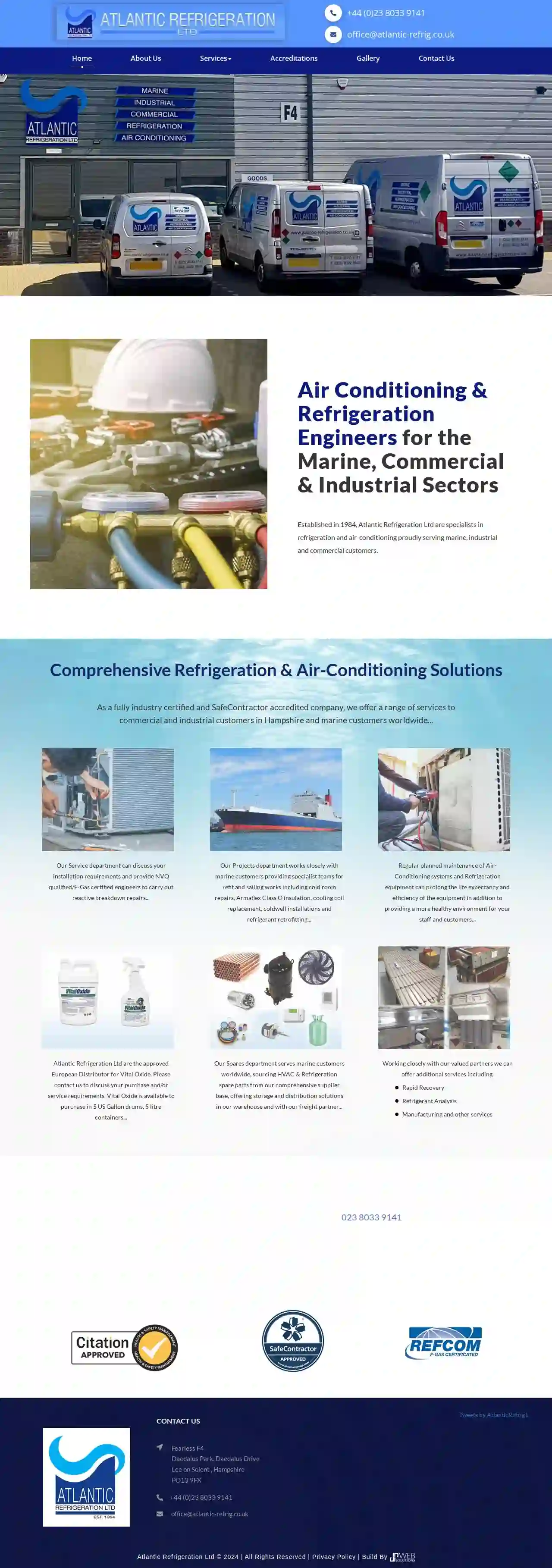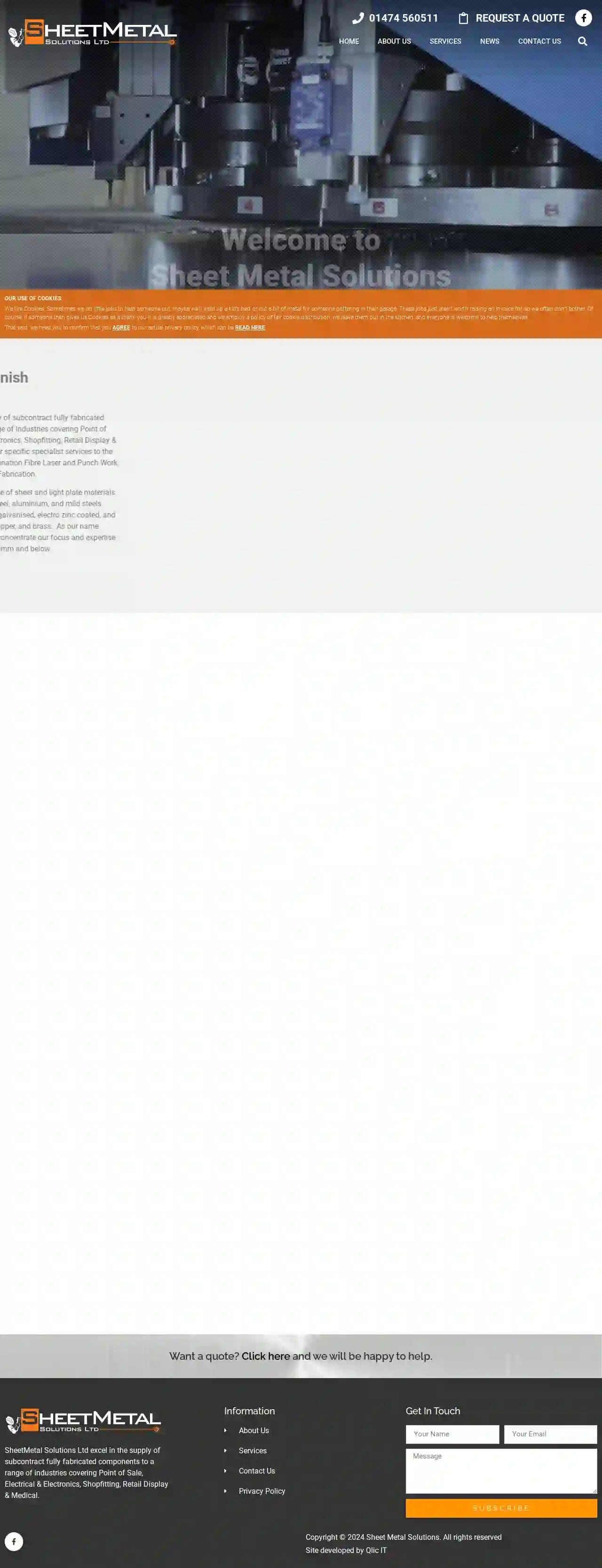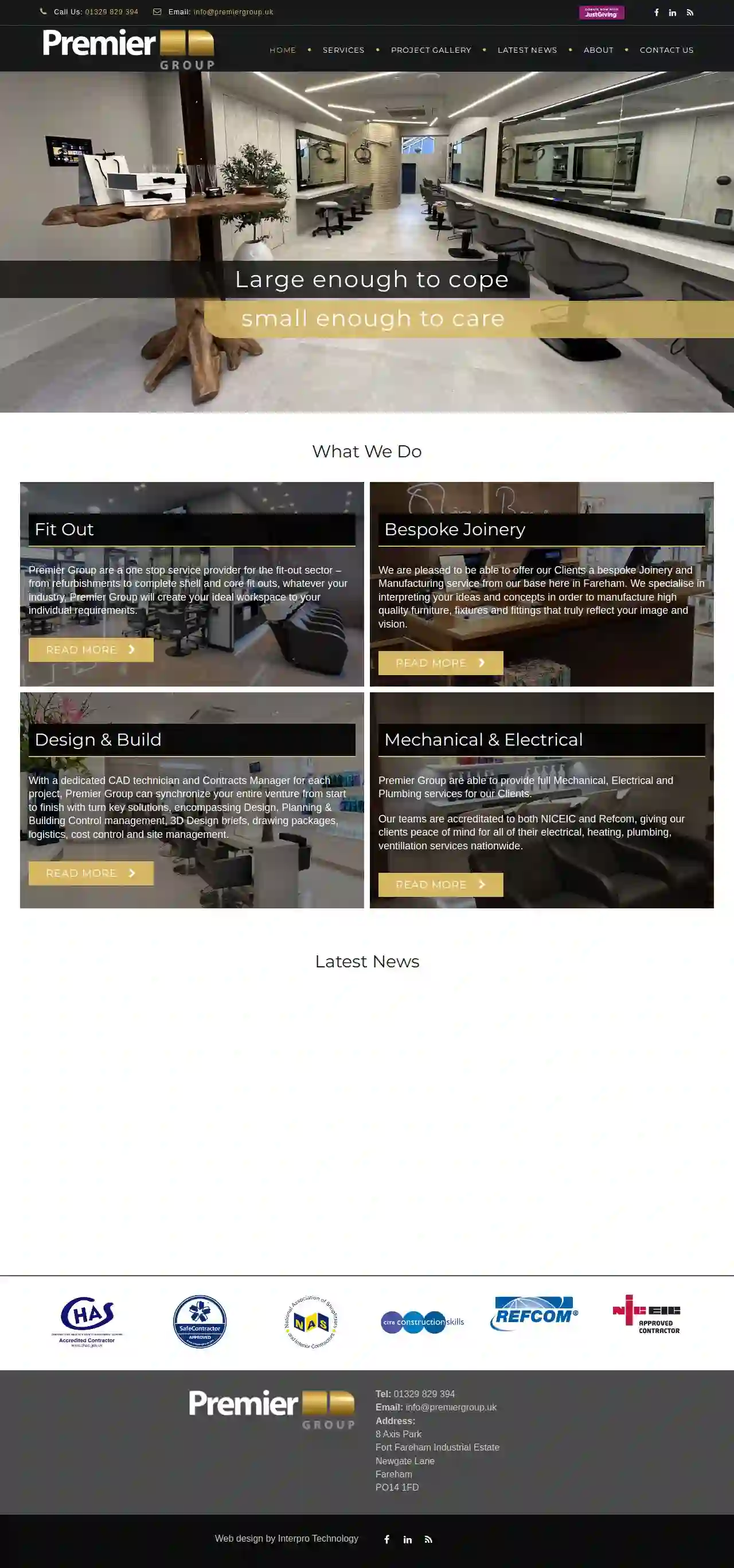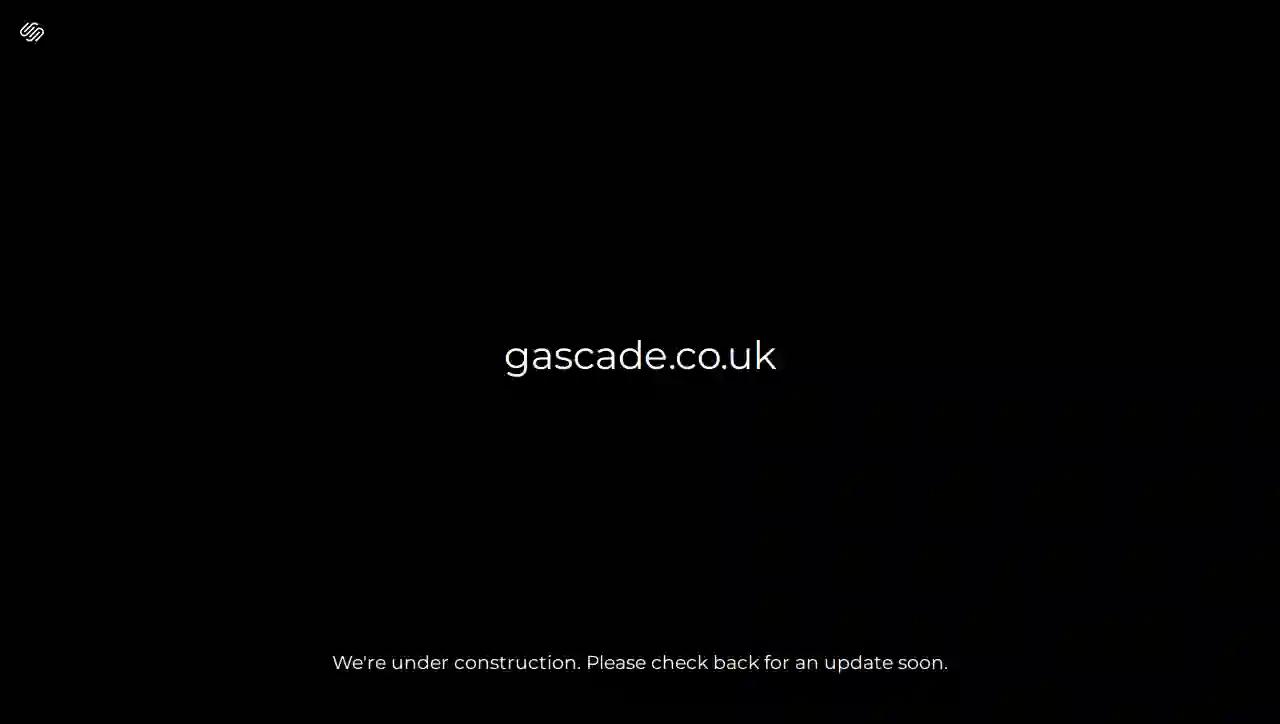HVAC Companies Brockenhurst
Top 10 AC and Heating Services in Brockenhurst
Get 3 FREE HVAC Companies quotes for your project today! Compare profiles, reviews, accreditations, portfolio, etc... and choose the best service.

Atlantic Refrigeration Ltd
51 reviewsDaedalus Park, Daedalus Drive, Lee on Solent, PO13 9FX, GBEstablished in 1984, Atlantic Refrigeration Ltd are specialists in refrigeration and air-conditioning proudly serving marine, industrial and commercial customers. As a fully industry certified and SafeContractor accredited company, we offer a range of services to commercial and industrial customers in Hampshire and marine customers worldwide.
- Services
- Why Us?
- Accreditations
- Gallery
Get Quote
Sheet Metal Solutions Ltd
55 reviewsFleet, GBWelcome to Sheet Metal Solutions, a company that offers a wide range of precision sheet metal solutions. We excel in the supply of subcontract fully fabricated components to various industries, including Point of Sale, Electrical & Electronics, Shopfitting, Retail Display & Medical. Our services include Combination Fibre Laser and Punch Work, Powder Coating, and Fabrication. We work with a variety of sheet and light plate materials, including Stainless steel, aluminium, and mild steels. As our name suggests, we specialize in thinner materials 8mm and below. We are at the forefront of innovation for precision sheet metal work within the UK.
- Services
- Why Us?
- Gallery
Get Quote
GDHS Plumbing & Heating
519 reviewsFleet, GBGDHS was established in 2009 and originally carried out general plumbing and heating works, and has since then evolved into delivering high spec residential developments, from single units to blocks of flats. We pride ourselves on our professional service, high standard of quality, and our extensive plumbing and heating knowledge gained through our years working in the industry. Located in Kent, GDHS operates throughout the South East and has successfully delivered a vast amount of projects, working closely with our clients to ensure their requirements are met and delivered on time. Need a quote for your project. Feel free to get in touch with our team, we'd be happy to help with any queries.
- Services
- Why Us?
- Testimonials
- Gallery
Get Quote
Premier Group
11 reviewsFort Fareham Industrial Estate, Newgate Lane, 8 Axis Park, Fareham, PO14 1FD, GBPremier Group are a one stop service provider for the fit-out sector – from refurbishments to complete shell and core fit outs, whatever your industry, Premier Group will create your ideal workspace to your individual requirements. We are pleased to be able to offer our Clients a bespoke Joinery and Manufacturing service from our base here in Fareham. We specialise in interpreting your ideas and concepts in order to manufacture high quality furniture, fixtures and fittings that truly reflect your image and vision. With a dedicated CAD technician and Contracts Manager for each project, Premier Group can synchronize your entire venture from start to finish with turn key solutions, encompassing Design, Planning & Building Control management, 3D Design briefs, drawing packages, logistics, cost control and site management. Premier Group are able to provide full Mechanical, Electrical and Plumbing services for our Clients. Our teams are accreditated to both NICEIC and Refcom, giving our clients peace of mind for all of their electrical, heating, plumbing, ventillation services nationwide. Large enough to cope small enough to care Delivering Excellence in Construction
- Services
- Why Us?
- Accreditations
- Gallery
Get Quote
Aura Heating
4.4171 reviewsNew Road, Aura House, Havant, PO9 1DE, GBAura Heating is the South's favourite heating experts. We have been helping customers in Hampshire, Surrey, Dorset, Sussex, Berkshire, South London and surrounding areas since 2005. We are your friendly, reliable, local plumbing + heating experts. Our team are available 24/7 to take your calls. We offer a range of services including new boilers, boiler grants, boiler repairs and servicing, oil boiler installs and maintenance, new boiler guarantee, heating care plans, and more.
- Services
- Why Us?
- Accreditations
- Our Team
- Gallery
Get Quote
Phoenix Heating
52 reviews25 Rockingham Way, Portchester, PO16 8QS, GBPhoenix Heating - Boiler Repair Emergency Plumber Portchester offers fast and specialist solutions to plumbing and heating emergencies. Our highly-trained professionals are available immediately for same-day call-outs. Gas and water emergencies can be very serious if ignored or left too long, which is why we offer emergency plumbing 24 hours a day, seven days a week. No matter where in the UK you live, we will be on hand to fix your plumbing problem and get you back to normality. A plumbing emergency can turn into a plumbing disaster very quickly. Don’t wait for things to get worse. Contact our emergency plumbers on 023 9379 0034 immediately. Our services include: Plumbing: Pipe Work, Pumps & Valves, Showers supplied & fitted, Tanks & Overflows, Toilets, Systems & Taps, Bathroom Suites, Emergency Work, Same day call outs Boiler Repair: Boiler Repair, Boiler Servicing, Radiator Repair, Radiator Replacement, Temperature Controls, Power Flushing, A-rated Central Heating, Boiler Installs & Swaps, Landlord Safety Certs (CP12) Emergency Call Outs: 24 Hour Call Outs, Water Leaks, Boiler Repairs, Internal Drainage, Blocked Toilet / Sink Why Choose Us? Our heating & plumbing repair and installation technicians are some of the best. Their skill, attitude and experience have meant that we have become a well-known company. 24/7 Emergency - Always available to take your call, and send an engineer to help if your in an emergency. Expert and Professional - We pride ourselves on our team of experienced professionals Satisfaction Guarantee - We guarentee only the upmost quality Where to find us 25 Rockingham Way, Portchester, Fareham PO16 8QS OPENING HOURS Saturday Open 24 Hours Sunday Open 24 Hours Monday Open 24 Hours Tuesday Open 24 Hours Wednesday Open 24 Hours Thursday Open 24 Hours Friday Open 24 Hours Copyright 2020 | Phoenix Heating - Boiler Repair Emergency Plumber Portchester
- Services
- Why Us?
- Gallery
Get Quote
Internal Environments Ltd
52 reviewsSegensworth, Fareham, Unit B2 Segensworth Business Centre, PO15 7AH, GBInternal Environments is a building energy efficiency and decarbonisation specialist. We pride ourselves on developing long-term relationships with our customers, who enjoy a high level of customer service and support from initial concept through to project fulfilment. With over a decade of experience and unparalleled technical expertise, our seasoned team is dedicated to delivering energy-efficient HVAC solutions tailored to our clients' needs. We specialise in high-efficiency HVAC systems, dedicated to decarbonising buildings for a greener future. Our attention to detail, commitment to excellence and customer focus allows us to adapt our designs and service to the individual requirements of each client. Trust us with your internal environment to ensure a sustainable HVAC solution.
- Services
- Why Us?
- Accreditations
- Gallery
Get Quote
Gascade
510 reviewsFleet, GBWe're under construction. Please check back for an update soon.
- Services
- Why Us?
- Gallery
Get Quote
Real Mechanical & Electrical Ltd
Grove House, Lutyens Close, Chineham Court, Lychpit, Basingstoke, RG24 8AG, GBReal Mechanical & Electrical Ltd has over 15 years experience in the Heating, Ventilating and Air Conditioning (HVAC) industry.We install and maintain HVAC systems at optimum performance to lower the overall cost of the equipment life cycle.Our fully trained engineers offer exceptional levels of expertise. We aim to keep our engineers updated on various manufacturers equipment with ongoing training.We are committed to providing you with the best advice and services for your requirements, whether it be a small domestic installation, or providing you with a comprehensive facilities maintenance program for your commercial building.
- Services
- Why Us?
- Accreditations
- Our Team
- Testimonials
- Gallery
Get Quote
SB Air Conditioining
54 reviewsMeopham, GBWelcome to our website! We are a Kent based air conditioning company that cover the south east, London and surrounding areas. We provide our clients heating, cooling or even a dehumidifier when needed. We supply quality to your climate. Being specialists in the trade we can assist with any of your air conditioning needs, covering all aspects of the trade. All of our works come with a guarantee and we leave our clients with 24/7 365 access to our help line. Our team are able to provide free, no obligation quotes and if you have any questions or queries, we are happy to help. With summer round the corner be prepared and get in before it's too late. We cannot stress enough the benefits of air-conditioning!!Checkout all of our recent projects over on our socials!
- Services
- Why Us?
- Accreditations
- Testimonials
- Gallery
Get Quote
Over 12,692+ HVAC Businesses onboarded
Our HVAC contractors operate in Brockenhurst and beyond!
HVACCompaniesHub has curated and vetted Top HVAC Contractors arround Brockenhurst. Find a trustworthy contractor today.
Frequently Asked Questions About HVAC Companies
- Frequent Repairs: If your system requires repairs frequently, it may be more cost-effective to replace it.
- Age of System: HVAC systems typically last 15-20 years. If your system is nearing or beyond that age, it's likely less efficient and more prone to breakdowns.
- Increased Energy Bills: A significant rise in energy bills might mean your system is losing efficiency and needs replacement.
- Uneven Temperatures: If some rooms are too hot or too cold, it could be a sign of an inefficient HVAC system.
- Poor Indoor Air Quality: If you're experiencing allergies, dust, or other indoor air quality issues, a new HVAC system with better filtration could help.
- Strange Noises or Smells: Unusual noises or foul odors emanating from your HVAC system could signal the need for a new HVAC system.
- Warm Air: The most noticeable sign is that the AC is blowing warm or lukewarm air.
- Ice Buildup: Ice may form on the refrigerant lines or evaporator coil.
- Increased Energy Bills: Your system has to work harder to cool, leading to higher energy consumption.
- Hissing or Bubbling Sounds: These sounds may suggest a refrigerant leak.
- Check Online Reviews: Look for HVAC companies with positive reviews and high ratings on platforms like Google, Yelp, and others.
- Ask for Referrals: Reach out to friends, family, neighbors, or colleagues for recommendations.
- Verify Licensing and Insurance: Ensure the company is properly licensed and insured to operate in your area.
- Look for Certifications: Check for certifications from reputable organizations like NATE (North American Technician Excellence).
- Compare Quotes: Get quotes from multiple HVAC companies to compare pricing and services.
- Use a Directory like HVACCompaniesHub: Simplify your search by using our directory of pre-screened and qualified HVAC professionals.
How long does an HVAC system last?
What are the signs that I need a new HVAC system?
What are the signs my air conditioner needs refrigerant?
How do I find a good HVAC company near me?
Finding a reputable HVAC company requires research. Consider these tips:
How long does an HVAC system last?
What are the signs that I need a new HVAC system?
- Frequent Repairs: If your system requires repairs often, it may be more cost-effective to replace it.
- Age of System: HVAC systems typically last 15-20 years. If your system is nearing or beyond that age, it's likely less efficient and more prone to breakdowns.
- Increased Energy Bills: A significant rise in energy bills might mean your system is losing efficiency and needs replacement.
- Uneven Temperatures: If some rooms are too hot or too cold, it could be a sign of ductwork problems or an undersized/aging system.
- Poor Indoor Air Quality: If you're experiencing allergies, dust, or other indoor air quality issues, a new HVAC system with better filtration could help.
- Strange Noises or Smells: Unusual noises or foul odors emanating from your HVAC system could signal a problem that requires a system replacement.
What are the signs my air conditioner needs refrigerant?
- Warm Air: The most noticeable sign is that the AC is blowing warm or not cool air.
- Ice Buildup: Ice may form on the AC unit.
- Increased Energy Bills: Your system has to work harder to cool, leading to higher energy consumption.
- Hissing or Bubbling Sounds: These sounds may suggest a refrigerant leak.
How do I find a good HVAC company near me?
Finding a reputable HVAC company requires research. Consider these tips:
- Check Online Reviews: Look for HVAC companies with positive reviews and high ratings on platforms like Google, Yelp, and others.
- Ask for Referrals: Reach out to friends, family, neighbors, or colleagues for recommendations.
- Verify Licensing and Insurance: Ensure the company is properly licensed and insured to operate in your area.
- Look for Certifications: Check for certifications from reputable organizations like NATE (North American Technician Excellence).
- Compare Quotes: Get quotes from multiple HVAC companies to compare pricing and services.
- Use a Directory like HVACCompaniesHub: Simplify your search by using our directory of pre-screened and qualified HVAC professionals.